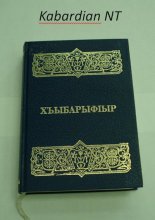 Don't biblical texts sometimes seem contradictory? And isn't it these very contradictions that make them relevant to all people, regardless of their ethnic, linguistic or historical contexts? The Bible is not abstract ideology, but rather a practical source of life, springing from God Himself, who is Love. Whoever reads the books of Job, Ecclesiastes or Proverbs as ideology may be at a loss. Whoever reads them from within real human situations may taste their all-embracing character. Likewise, the messages from the two translation teams, Adyghe and Kabardian, whose members gathered for a discussion at the recent IBT seminar on the Wisdom and Poetic books of the Old Testament at first seemed contradictory. However, this was an informal conversation, and the very topic of the seminar helped to explain that impression.
Don't biblical texts sometimes seem contradictory? And isn't it these very contradictions that make them relevant to all people, regardless of their ethnic, linguistic or historical contexts? The Bible is not abstract ideology, but rather a practical source of life, springing from God Himself, who is Love. Whoever reads the books of Job, Ecclesiastes or Proverbs as ideology may be at a loss. Whoever reads them from within real human situations may taste their all-embracing character. Likewise, the messages from the two translation teams, Adyghe and Kabardian, whose members gathered for a discussion at the recent IBT seminar on the Wisdom and Poetic books of the Old Testament at first seemed contradictory. However, this was an informal conversation, and the very topic of the seminar helped to explain that impression.
The very first thing that worried the speakers was whether their names would be mentioned in the interview. If so, they would rather have kept silent, though love for their native land and fellow countrymen urged them to speak out.
“The situation for Christians in the Caucasus is very hard. Of my entire family only my father and mother now know what my work is. I have to choose between my project and my relatives all the time”, one young woman sighed. “It was when I converted that the persecution was greatest, and one of my closest relatives came to my church with a gun in order to kill me. 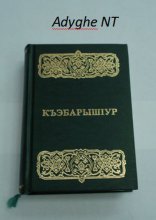 I lived in an atmosphere of constant fear… We do not have problems with the authorities, but we are not accepted at home. If a girl is not married and dares to go to various seminars, it is considered ridiculous. She is looked at as if she were mad. Therefore nobody knows that I am here”.
I lived in an atmosphere of constant fear… We do not have problems with the authorities, but we are not accepted at home. If a girl is not married and dares to go to various seminars, it is considered ridiculous. She is looked at as if she were mad. Therefore nobody knows that I am here”.
Changing the subject to her translation team and the relations within it, all of a sudden she forgot the tensions of being a Christian in a patriarchal culture, and shared excitedly, “Our team spirit makes me happy despite all the differences between our faiths and confessions. These aspects do not really matter for the Caucasian people. What really matters in my land is one’s humanity. None of us will ever say, ‘I am a Christian, while you are a Muslim, thus we do not have anything in common’. It is much more significant for us to see what sort of a person you are, what you do, how you work, and what your human traits are. If you deserve respect, you will be respected and listened to. In theWest you may come up to a person with the Scripture and suggest that he reads from it. If he reads and converts, he will find out from the Book itself what he needs in order to start a new life, and he will look upon you with new eyes, the eyes of a believer. It is not so in the Caucasus. People will first look at you, at your manner of life and behavior, and if you deserve their respect, they may become interested in your Holy Scripture and accept it from you”. Such was the portrait of the Caucasus she depicted, disclosing a very different facet of the region from the one in her first disclosure a few minutes earlier.
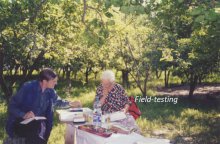 The second person I interviewed, a member of a translation team in a closely related Caucasian language, belonged to a different age group. She spoke from her life experience, “My relatives are non-believers, though they are nominal Muslims or nominal traditional Christians. They think that I am crazy. They say, ‘She was studying and training until she went out of her head’, and this expression sounds proverbially precise in Adyg”*.
The second person I interviewed, a member of a translation team in a closely related Caucasian language, belonged to a different age group. She spoke from her life experience, “My relatives are non-believers, though they are nominal Muslims or nominal traditional Christians. They think that I am crazy. They say, ‘She was studying and training until she went out of her head’, and this expression sounds proverbially precise in Adyg”*.
Once we started speaking about her countrymen, this lady forgot her own troubles in the very same manner as did the first one. Her words now reflected deep and selfless love. And again it was a proverbial expression that first came to her mind, “We have an interesting expression. When you ask a person, ‘Aren’t you Adyg?’ by this you mean, ‘Do you have a human heart? Are you able to show human kindness?’ This is how we respect the word ‘Adyg’ and understand the importance of being ‘Adyg’ not only by nationality, but in the depth of one’s inner being”.
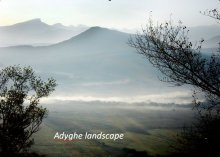 The Christian members of our “Adyg” translation teams showed affection and empathy towards their Muslim colleagues. “I'm glad that we're unanimous in our work. We serve the same God, but we have already understood whom we serve, while they are still on the way. I was on this way myself, so I would never try to rush anyone”. The verse from Song of Solomon came to mind that we should not stir up love until it so desires, not to rush anyone, until their own love awakens. “Our Muslim translators are God-fearing people. And for me it is most important that the person fears God. Not everybody gets the knowledge of God whom he venerates from the very beginning”, the woman continued, and her words strikingly echoed another verse, this time from the book of Proverbs, which had just been mentioned at the previous session of the seminar, “The fear of the LORD is the beginning of knowledge” (1:7).
The Christian members of our “Adyg” translation teams showed affection and empathy towards their Muslim colleagues. “I'm glad that we're unanimous in our work. We serve the same God, but we have already understood whom we serve, while they are still on the way. I was on this way myself, so I would never try to rush anyone”. The verse from Song of Solomon came to mind that we should not stir up love until it so desires, not to rush anyone, until their own love awakens. “Our Muslim translators are God-fearing people. And for me it is most important that the person fears God. Not everybody gets the knowledge of God whom he venerates from the very beginning”, the woman continued, and her words strikingly echoed another verse, this time from the book of Proverbs, which had just been mentioned at the previous session of the seminar, “The fear of the LORD is the beginning of knowledge” (1:7).
The last person I in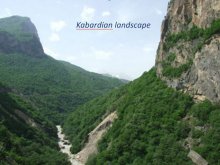 terviewed was a male translator who declared that he is on the way, though a believer in Christ already. For him, coming to faith does not mean that he has stopped on the way, but rather that he has made a start. He concluded the whole discussion with the following words, “Spiritual growth has its stages. Today we understand one layer of biblical meaning, but in a year we will understand more. When several Adyg teams unite to work together, we may exchange words and terms, because when there are more people working with a unity of purpose, more layers of meaning will be opening up to us. The more translations are made into our languages, the more meanings are revealed to us. We should translate in such a way that the rich variety of meaning in the original becomes evident in our mother tongue”.
terviewed was a male translator who declared that he is on the way, though a believer in Christ already. For him, coming to faith does not mean that he has stopped on the way, but rather that he has made a start. He concluded the whole discussion with the following words, “Spiritual growth has its stages. Today we understand one layer of biblical meaning, but in a year we will understand more. When several Adyg teams unite to work together, we may exchange words and terms, because when there are more people working with a unity of purpose, more layers of meaning will be opening up to us. The more translations are made into our languages, the more meanings are revealed to us. We should translate in such a way that the rich variety of meaning in the original becomes evident in our mother tongue”.
The Books of Exodus and Proverbs in Adyghe and the Book of Proverbs in Kabardian will be published in 2014. Your financial and prayer support is very welcome.
___________________
* Although both women call themselves Adyg, they belong to different projects and different but closely related peoples. Unlike the word “Adyghe”, which describes one particular IBT project, the word “Adyg” is the self-designation (endonym) used by several Circassian people groups now scattered in different parts of Russia.

Share: